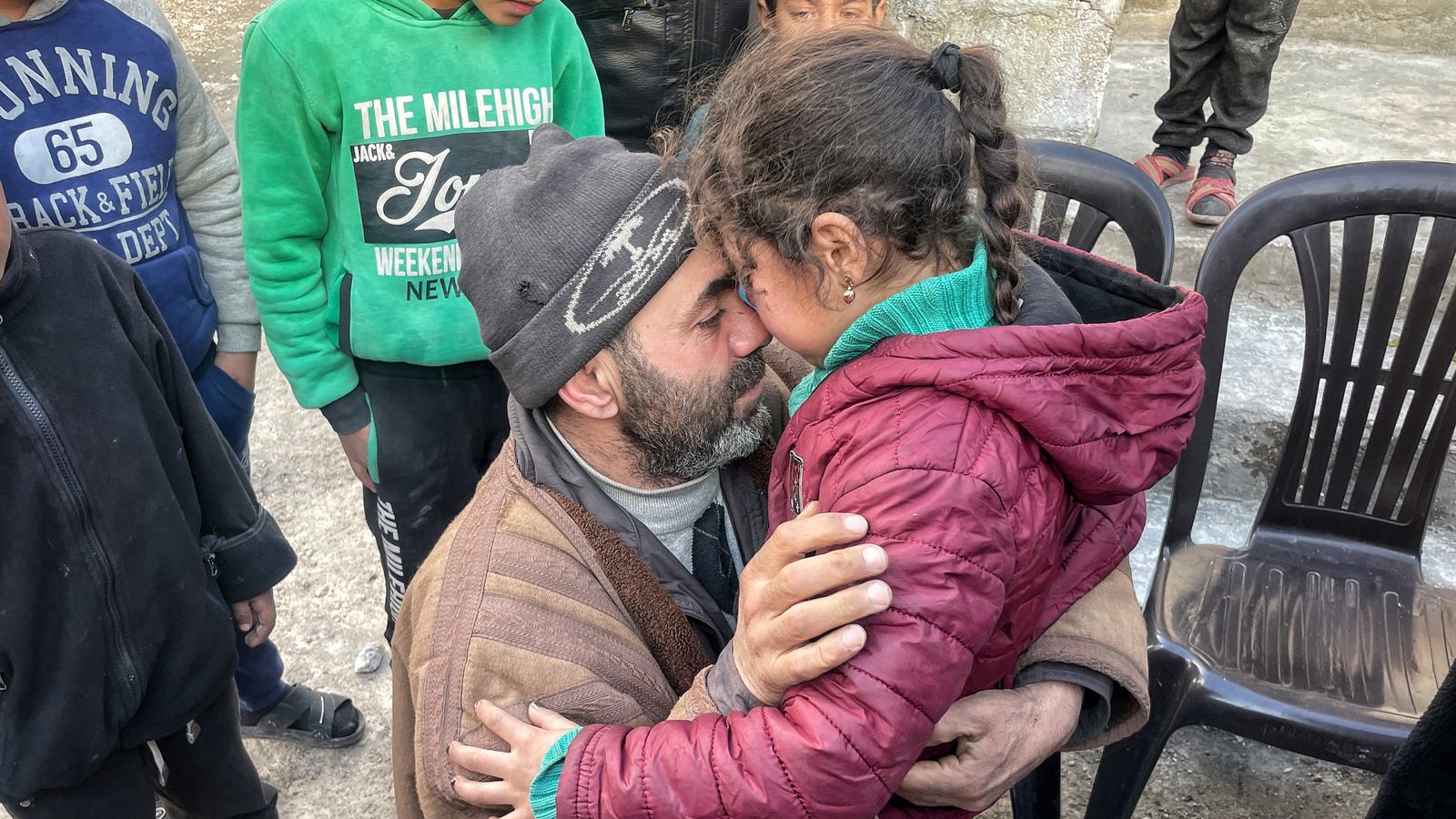Turkey-Syria earthquake: Rebel leader in Idlib calls for urgent international help as families devastated by quake

Syria’s suffering is a unique desolation and inside Idlib we’ve seen the face of utter desperation.
Here, they thought their plight couldn’t get any worse than running from shelling and cowering from regime bombs, but what was already an horrendously wretched life for millions, has become a whole lot more tragic since the earthquake.
People fear the cold and hunger will kill them now.
Turkey-Syria earthquake – latest: Turkey refuses aid from neighbouring Cyprus
Those who’ve fled from Bashar al Assad’s bombs and bullets for 12 years, have found themselves running again as their homes collapsed and the earthquakes tore into infrastructure already massively weakened by years of war.
We watched in Salquin as the White Helmets, a Syrian civil defence group which receives funding from the UK, searched through piles of rubble.
The chances of finding anyone alive now seems crazily optimistic but they don’t give up their digging and searching. It goes on day and night.
Just 12 hours earlier, a young man had been pulled out of here alive. Instances like that keep them going.
They’re spurred on too by the grim realisation they are on their own and there’s no one coming anytime soon to help them.
Five days on from the worst set of earthquakes in this region in a century, there appears to be no international aid of any note and no teams of search and rescue experts.
Idlib is the last pocket of Syria holding out against Basher al Assad’s regime in Damascus and is held by an armed group called Hayat Tahir al Sham (HTS), headed by Abu Mohammed al Jolani.
He was once a member of al Qaeda before falling out with the group and forming his own fighting not only al Qaeda remnants, but Islamic State cells and the Assad regime as well.
He’s still on a terrorist most-wanted list drawn up by a number of nations including the US.
But when we spoke to him at the destroyed site in Salquin where they were searching for a missing family, he denounced the international community for not helping the desperate people of northwest Syria.
“The children being found under this rubble are not terrorists,” he said.
He called on the world to discard politics, concentrate on the people, and send help to the region.
We saw a father sitting in the dark, clutching a blanket wrapped round his dead four-year-old son.
The child – his face covered with dust and the blue-grey cold mask of death – was called Mohammed.
He’d been pulled out after four days trapped in the rubble, still wearing his pyjamas.
His father, Saleem, was in shock, his face stony hard, devoid of any emotion.
He had his little boy laid near a fire for warmth, which he could no longer feel, as if somehow it helped him, as if it might bring him the comfort his father couldn’t provide for the previous four days.
Saleem had no way of knowing if his little boy had laid there, alive but trapped and frightened for days on end waiting for the help which never arrived.
Saleem somehow scrambled to safety while grabbing the hand of his little girl, Mace, and running.
Mace is eight years old and she and Saleem are the only ones who made it out.
Behind them, men from the White Helmets operated diggers tearing into the rubble while colleagues lifted rocks and pulled at blankets peeping out from them.
They were trying to find Saleem’s 10-year-old son Abdul Razek and his wife Amira.
“I will not leave until I find them,” he said. “I cannot.”
He breaks off occasionally, pleading with the White Helmets to try different corners of what was once their home.
Read more
‘The world has collapsed on its head’
Rescuers face mind-blowing devastation
How you can help save lives
Is more aid being sent to Turkey than Syria?
The Team leader is Mustafa Kharzum and he knows all about the grief of losing a son.
His died from illness but the loss of a child never leaves a heartbroken parent.
“I know what he’s going through and I’ve promised him I will not leave here until we find his family,” Mustafa says.
They’re there all night and then all morning. By midday they’re confident they are not still in the rubble, so they start to trek through the hospitals.
Could they still be alive and, somehow, someone has taken them there?
There’s a tiny moment of hope yet again but it’s soon crushed when they find the bodies of both mother and son in the morgue of a hospital.
Saleem is distraught. “They were my world,” he says, “I worked for them. I did everything for them.”
His little girl Mace sobs as crowds of mourners gather round the family home in Mashhead Roheen, close to the Turkish border.
The family fled Ma’arat al Numan where they used to live when the Assad regime troops moved in three years ago.
They survived the long war only to see half the family wiped out in the earthquake.
At the home, the family’s female relatives wash the little boys’ bodies ready for burial.
Tiny children are wailing and howling with grief.
The grandmother, Fatima, collapses and is carried to a chair. She’s seen three of her sons die in the fighting and war – now she’s mourning a daughter and two grandsons.
This misery is too much to bear for them. The heartache is never ending for the Syrian people and once again, they’re feeling no one anywhere is hearing their cries or cares about their sorrow.
Alex Crawford was reporting from Idlib in northwestern Syria with camera operator Jake Britton, and producers Chris Cunningham and Mahmoud Mosa.
There will be a special programme called Disaster Zone: The Turkey-Syria Earthquake on Sky News this evening at 9.30pm.